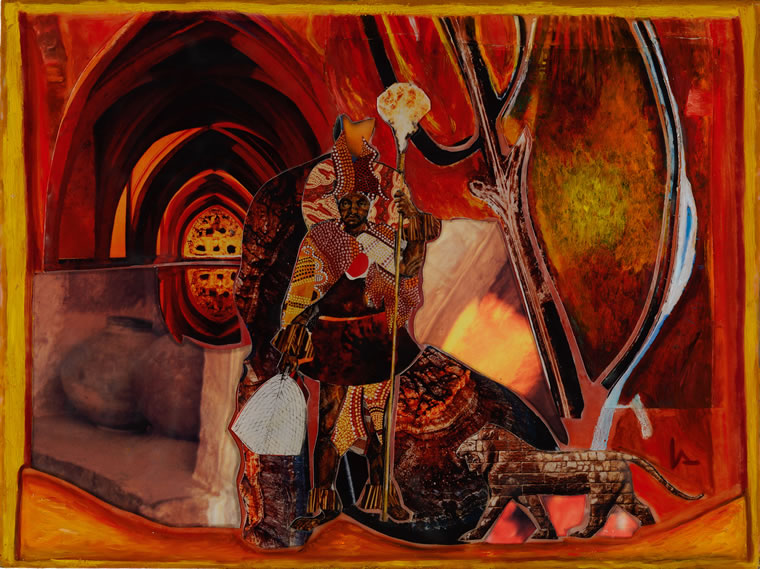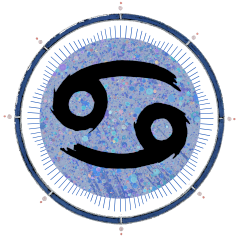
Dear Friend and Reader:
Beginning in late June, Mars will be retrograde, mostly in Aquarius. Mars retrograde is a ritual we go through for about two months every two years, and it’s always significant; always an adventure. This is particularly true in our era when the role of men and maleness is being questioned, subjected to scrutiny and, in many ways, taking a clobbering.
Everyone has Mars in their chart, so it represents the masculine principle more specifically than it does men. Therefore, the issue is maleness, which is often unfairly attributed exclusively to male-bodied people. However, it would seem, looking at the world, that maleness, or a mode of existence known in Japanese as sanuki, is taking over reality.
These days, nearly everyone is a manager, a boss, a technician, a CEO, a COO, an organizer or some sort of agenda-driver. This is a kind of epidemic. We are now all expected to “make our lives happen,” to change the world, and even to be the master of the universe: after all, we “create our own reality.” Note: this is a lot of pressure to be under, and to put one another under.
The corollary property is awa, which is a reservoir of feeling, receptivity, sensory experience and physicality. If sanuki is what asserts itself against existence and attempts to manage it, awa is what imbibes, receives, senses and gestates existence. Right now, there’s very little awa to go around, in women or in men. Women are supposed to have more than men organically; awa means womb, and men don’t have one of those. Yet sanuki is running wild in both sexes and all genders.
Most of us have been pushed out of our bodies and our senses by over-immersion in the internet. The whole notion of feeling is becoming obsolete. Who needs it, when we have ever more realistic versions of virtual reality?
What we are currently experiencing on Earth is mostly a product of electrical technology, and of urbanization, and thus of being cut off from natural cycles. It’s impressive how little discussion there is of these issues. Have you noticed how many people around you are having trouble sleeping? How are you sleeping? The probable reason for this is that microwave networks are now ubiquitous, and soak the world in invisible light that is equivalent of sleeping with the lights on. We live in a world of perpetual daytime.
Hormone Chaos in Action

As regards maleness and femaleness, there is another factor: hormonal toxins. These include many pesticides, herbicides, PCBs, chemical byproducts such as dioxin and even aspartame sweetener — all of which are ubiquitous, meaning everywhere. Whether you test breast milk or blood, you find scores of toxic compounds in most people, and some in everyone. These chemicals are all endocrine disruptors, meaning that they scramble the body’s natural hormone messages, which regulate many functions we think of as mental and psychological. Most often, these chemicals mimic estrogen, which influences both men and women.
Now we are surrounded by plastic. This had me nervous from the time I saw my first two-liter plastic soda bottle around age 10. Plasticizers such as BPA and phthalates are in nearly every bite of food. They have similar hormone disruption properties as dioxin. We piss them out faster, and also take them in with every sip of bottled water, and everything else in plastic: every wrapper, can liner and so on.
There are two ways to describe these chemicals: one is to say that they are feminizing. In men, for example, soaking in xenoestrogenic compounds (xeno meaning external, estrogenic meaning like estrogen) are a likely cause of rapidly declining sperm counts, semen volume and even penis size (if a fetus is exposed). They’re also a likely (or proven) cause of endometriosis and many cancers, including those of primary and secondary sexual organs.
Another way to describe these chemicals is as agents of hormone mayhem, though that has implications on the psychic level (mental/emotional), as well as social. Gender-bending is fantastic if that’s what you’re into. However, our continuous overdosing on hormone disruptors is a constant source of destabilization — in particular, of all the things that combine into this thing we call sex and gender, and thus our social patterns and our feelings.
So, what we think of as “the environment” is working on two major levels: chemical and energetic; and these are making it difficult to reside in-body and in our feelings. These chemicals are making it just as difficult to have any organic sense of who we are, in terms of natural sex and gender. This, in turn, spills over many different aspects of existence, since in the end, everything comes back to sex, what created us in the first place.
So, as you consider the astrological ideas I’m about to present, please also consider the background environment of confusion and chaos that our hearts, souls and attempts to exist peacefully are currently set within.
Mars: Assertion, Aggression and Discovering Who You Are

In astrology, Mars is associated with asserting oneself. It’s the planet that rules Aries, the first sign of the zodiac, and the sign linked to the statement, “I am.” Everything about Mars comes back to this one idea.
Mars is also associated with desire and aggression, and is, of course, named for the Roman god of war. So Mars is associated with (or, in astrological terms, ‘rules’) the spectrum of experiences from desire, to sexual desire, to wanting a new car, to pushing yourself into others, to aggressively making demands; and its range extends to all-out war, murder and mayhem. These things exist along one spectrum. And since we all have Mars, we all exist somewhere — or various places, at various times — along this spectrum.
Marshall McLuhan, in his 1968 book War and Peace in the Global Village, proposed a reason why violence is so pervasive in our society: it’s an attempt to find out who we are. The less we know who we are, the more violence there is, and that’s where we are today. On the most basic level, ‘violence’ means asserting yourself against your environment, no matter how meekly; typically you will encounter resistance.
The daily scrapes in life, the normal abrasions and collisions and bumps and grinds that we have with others, are among the most important ways we find out who we are — and for most, the only way. It may be painful at times, but it’s how we discover our nature and our boundaries. People who spend their lives avoiding conflict tend to live in a dark world where their true essence remains a mystery to themselves, and such people often lack any sense of their boundaries.
McLuhan’s theory strings together all the attributes of Mars, which begins with “I am” and runs the spectrum from desire to assertion to aggression to violence to warfare, and returns back to “I am.”
I have a corollary to McLuhan’s theory: were we able to express sexuality in a more wholesome and full-spectrum way, we might have another means of self-discovery. So while we live in this environment of violence and aggression every were turn, and the world on the constant brink of war, we might consider if this is not made much worse by the suppression of natural sexuality.
Herein lies the problem: in our society, Mars and all it represents are projected onto men. Men are assumed to be the only beings that possess desire or aggression; somehow Mars was allegedly not around for the births of four billion women the past century. So if Mars is involved, men are blamed.
Aquarius: The Patterns of Society

Thanks to the musical Hair, we think of Aquarius as being about peace, love and understanding. No offense to Aquarians, though this is wholly a work of fiction, not based on a true story. Aquarius is the sign of social patterns, and of energy patterns in general.
The social pattern thing we are accustomed to understanding by way of the idea that Aquarius is the sign of groups. The thing about groups is that they have rules, and they have configurations, and to some extent, a person must sacrifice their individuality to be part of one. That is the law of the tribe. Tribes don’t brook much in the way of individuality. In fact, it can be downright horrid, as we all know, and throw people to the wolves for even meekly asserting who they are.
Aquarius also is involved in the patterns of nature, which include electrical patterns: that would be, for example, the electrical grid, the internet, and the 3G and 4G networks that we live within.
In our time of history, very nearly every relationship, every transaction, every creative act, every quantum of communication, is conveyed electronically, to some extent. So we have to fit our biological, emotional and creative beings within the prevailing electronic patterns — and the result is a form of tyranny.
One effect of the group on the individual is to “tribalize” him or her, now more than ever before. Another is to rip our insides out, exposing the most intimate contents of our lives, to be seen and consumed by the rest of the tribe. There is no privacy in the electronic world.
The electrical realm also polarizes everything. The internet is an ocean of zeros and ones: of binary code. If “the medium is the message,” the message of the medium of the internet is to cast everything as black or white, us or them, right or wrong. Everything exists in polarized opposition to something else, and no gray areas are possible, since in binary terms, gray is an illusion (so too is color).
That is the world we currently live in, unless of course you count the actual human dimension of compromise and understanding, which only exists off of the internet, and not so many places at that.
When Mars Stands Out

When we say Mars is retrograde, that’s another way of saying it’s close to the Earth. Retrograde motion is an illusion of backwards motion created by the Earth, which moves faster than Mars, overtaking Mars as it passes by. The Earth is going faster, so Mars seems to be going backwards.
One effect of this is that around the time of a retrograde (for about six months, actually), Mars spends a lot of time in a narrow band of the zodiac, in this case, very late Capricorn and early Aquarius. Each in its own way represents the structure of society, whether physical or bureaucratic in the case of Capricorn, or energetic and social in the case of Aquarius.
Retrograde in Aquarius, Mars will be going against the grain of society’s prevailing norms and accepted rules. It will be an interesting time for the sex, gender and consent conversation we are having. Yet there are questions that are likely to be overlooked, beginning with: whose property is Mars? To whom does it belong? In the healthiest psychological sense, Mars is about volition. Volition is the faculty or power of using one’s will. Anyone who disowns Mars disowns their own will; what is sometimes called agency: the ability to make decisions for yourself. If Mars is about men, then men are the only people who have volition and agency.
Mars is also about desire. Who owns desire? If Mars is projected onto men, which it is nearly all of the time, then that is a decision by society that men alone possess and are responsible for desire. Does that sound like a good idea? Note that conflict over desire usually manifests as guilt. Who owns that stuff? Can we ascribe guilt to a narrow section of the marketplace, or is it a ubiquitous emotion?
Finally, there’s one last Mars bit that I have not mentioned yet: rage. We have an anger problem in society right now. If you look right at it, or even catch a glimpse, it can be deeply unsettling. Most individuals mask their anger in sadness, depression or complacency. Below the surface, it has a tendency to become even more toxic, and mixed in with most anger is the contents of a well tapping into something emerging from a deep and old place.
That energy has to go somewhere. The question is, where? Where is it appropriate to acknowledge, to process or to release? How do we process that in a constructive and creative way? Do you ever get the feeling that you just don’t know?
So do I.
Yours & truly,




